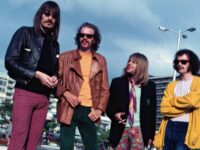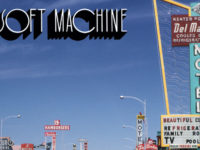One of the greatest unheralded rock bands to come out of the UK in the sixties was a group of musical misfits called The Soft Machine. This combo was among the earliest and most influential bands from Britain’s Canterbury Scene in the middle of the decade; a loose fraternity that also provided the genesis for Gong, Caravan and Henry Cow. Like most of their Canterbury colleagues, The Softs consisted of well educated musicians who soon broke out of r&b and pop beginnings to take on increasingly experimental blends of styles. For The Soft Machine, that meant psychedelia, avant-garde and some of the first manifestations of jazz-rock.
The lineup of this group had gone through endless permutations; Andy Summers and Allan Holdsworth were among the musicians who had quickly passed through their ranks at various times. By the time of this recording this infant band had already gone through a change from it’s original configuration; Australian guitarist Daevid Allen was forced to quit due to visa difficulties. Until the end of 1968, The Soft Machine was now a trio consisting of guitarist/bass player Kevin Ayers, organist Mike Ratledge and drummer Robert Wyatt.
About a third of the songs eventually made it into the Softs’ first lp a year later; the rest never made it onto any proper studio albums (although a couple of them were recorded as demos earlier in the year). Stacks of live recordings from the classic lineup Soft Machine have been floating around for years, but official releases of live material dating to before the first album have been rare; the intensity of their performances in a club setting didn’t lend itself well for making decent recordings.
One particular performance, set at Covent Garden’s Middle Earth on September 16, 1967, was painstakingly scrubbed by mastering engineer Michael King, and released by the Cuneiform label last year. King wasn’t entirely successful–the sparse vocals are still hard to ascertain in most places–but a good enough job to know that the patrons at the Middle Earth Club had a mind-blowing experience.
For those who have already followed The Soft Machine, the revelation in these masters are how far along this band already was in its march from a pyschedelic pop combo to a sweaty, nimble fusion combo that came into full bloom just two and a half years later on Third. The advanced group interplay and improvisation to the degree performed here had to have been new to rock music at that time, even with the wrong notes played here and there. It might have been Miles Davis’Bitches Brew bands of 1970 before any other rock band played live with such an intense, loud and free-form groove without the reliance of an electric guitar to achieve it.
Ayers in this early stage of the bands’ career was still the primary songwriter, and many of his tunes retained a pop sensibility to them. But the band members were clearly stretching his songs to their very limits. Ayers does play the frontman as guitarist and lead vocalist on the relatively mainstream pop of the first two tracks “Clarence in Wonderland” and “We Know What You Mean”, but switches to bass after the jazzy instrumental “Bossa Nova Express” and the proceedings get more and more unhinged as he fades into the background.
Robert Wyatt was the man behind the drum kit. He combined uniquely agile percussion with a wispy, slight voice that compensated for its shortcomings with absurdist humor and a certain humanism that remains at the core of his music to this day. The huge downside in this live recording is that his vocals rarely rose to the front of the mix, as the band members were all playing rather loud. That mars what appeared to be a souful vocal performance on the Traffic-like “That’s How Much I Need You Now”. You still get a nice feel for his skin beating skills; on “I Should Have Known” he displays a style that combines Elvin Jones’ polyrhythmic dexterity with the near abandonment of Keith Moon.
While Wyatt represented the main character in the band, Mike Ratledge was at the musical center. Cutting a tall profile in contrast to the 5’7″ Wyatt with an appearance that suggests proto-Johnny Ramone, it was Ratledge’s keyboard wizardry that was truly ahead of its time, rather than his looks.
Then, as it’s been throughout his ten year tenure with the band, his fuzzy, adventurous and overpowering Lowry organ was the most recognizable aspect of The Soft Machine sound. Keeping a low profile on the aforementioned first two tunes, and tepidly emerging on “Bossa Nova Express”, Ratledge cuts loose about 2:20 into the thirteen minute long “Hope For Happiness” with such an over-amped tone, he sounds much like a heavy metal guitarist in parts. It’s impossible to think that Rod Argent or Jon Lord of Deep Purple didn’t later take a cue from this guy. Combined with Ayers’ fat bass and Wyatt’s powerfully supple drumming, this sounded like one defeaning and scary power trio.
Ratledge’s tour-de-force on “Happiness” was followed by the all out freak-fest of the totally dissonant (and appropriately titled) “Disorganisation”. The kinetic chant of “We Did It Again” soon gives way to more of Mike’s organ pyrotechnics. Ayers joins him with an over amped guitar on “Why Are We Sleeping” to create a garage band on steroids. Overall, Mike Ratledge would have sounded right at home in Jeff Beck’s seminal first group, another band bringing the intensity of rock to a whole new level at the time, but didn’t put their new sound to wax for another year.
In a far-out year and a far-out scene, The Soft Machine stood out. Way out. Listen to the Middle Earth Masters next to Piper At The Gates of Dawn and you will begin to wonder what was it that was so deadgummed freaky about Syd Barrett-led Pink Floyd. Relax, Floyd fans, Piper remains the better record without any argument. It just sounds a little bit more mainstream after experiencing what The Soft Machine was putting down at about the same time.
- Ches Smith Quartet – ‘Clone Row’ (2025) - May 30, 2025
- James Brandon Lewis Quartet – ‘Abstraction Is Deliverance’ (2025) - May 27, 2025
- Soft Machine – ‘Drop’ (1971, 2025 remaster) - May 21, 2025



